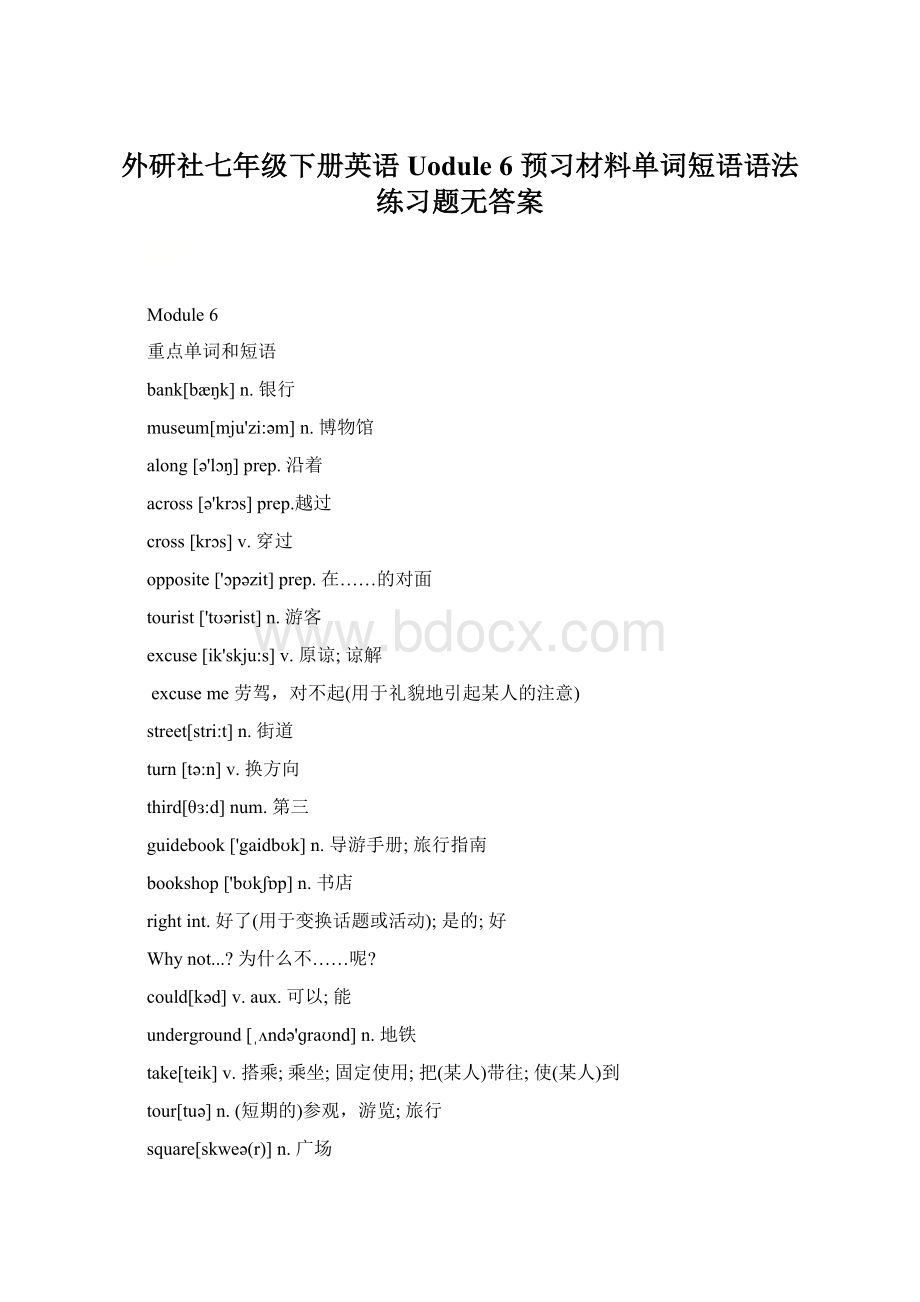外研社七年级下册英语Uodule 6 预习材料单词短语语法练习题无答案.docx
《外研社七年级下册英语Uodule 6 预习材料单词短语语法练习题无答案.docx》由会员分享,可在线阅读,更多相关《外研社七年级下册英语Uodule 6 预习材料单词短语语法练习题无答案.docx(17页珍藏版)》请在冰豆网上搜索。

外研社七年级下册英语Uodule6预习材料单词短语语法练习题无答案
Module6
重点单词和短语
bank[bæŋk]n.银行
museum[mju'zi:
əm]n.博物馆
along[ə'lɔŋ]prep.沿着
across[ə'krɔs]prep.越过
cross[krɔs]v.穿过
opposite['ɔpəzit]prep.在……的对面
tourist['tʊərist]n.游客
excuse[ik'skju:
s]v.原谅;谅解
excuseme劳驾,对不起(用于礼貌地引起某人的注意)
street[stri:
t]n.街道
turn[tə:
n]v.换方向
third[θɜ:
d]num.第三
guidebook['gaidbʊk]n.导游手册;旅行指南
bookshop['bʊkʃɒp]n.书店
rightint.好了(用于变换话题或活动);是的;好
Whynot...?
为什么不……呢?
could[kəd]v.aux.可以;能
underground[ˌʌndə'ɡraʊnd]n.地铁
take[teik]v.搭乘;乘坐;固定使用;把(某人)带往;使(某人)到
tour[tuə]n.(短期的)参观,游览;旅行
square[skweə(r)]n.广场
middle['midl]n.中部;中间
adj.中等的;中部的
famous['feiməs]adj.著名的
painting['peintiŋ]n.油画;绘画
from[frəm]prep.从……出发
metre['mi:
tə(r)](AmEmeter)n.米
above[ə'bʌv]prep.在……上方;在……之上
river['rivə(r)]n.河;江
clear[kliə(r)]adj.(天气)晴朗的
bridge[bridʒ]n.桥
railway['reilwei]n.铁路
past[pɑ:
st]prep.路过(某物或某地);越过
church[tʃɜ:
tʃ]n.教堂
finish['finiʃ]v.结束;完成
high[hai]adj.高的
postoffice[pəust'ɔfis]邮政局
up[ʌp]prep.沿着......而去.
down[daʊn]prep.沿着
stop[stɔp]n.车站
语法回顾
1.Excuseme!
CanyoutellmethewaytoWangfujingDajie?
Isthereabookshopnearhere?
HowcanIgettotheNationalStatium?
CouldyoutellmehowtogettotheNationalStatium?
以上都是问路的常用表达方式,总结如下:
Whereis…?
……什么在地方?
HowcanIget/goto…?
到……怎么走?
Excuseme.Canyoutellmethewayto…?
劳驾,到……怎么走?
Canyoushowmethewayto…?
能告诉我到……怎么走?
Isitfarfrom…to…?
从教堂到车站有多远?
指路的常用表达方式,总结如下:
TaketheNo.22bus/thisstreet.
Goalongthestreet…
Followthisroad…
Turnleft/right…
Turnleftinto…
It’saten-minutewalk.
Takethefirst/secondroad/acrossingontheleft/right
Gostraightonuntilyoucometo…
Ittakesabouttenminutesbybus.
Youcan’tmissit.
…
2.GoacrossDongChang’anJie…
此处的goacross=cross,表示“穿过”,前者across是介词,而后面的cross是动词。
【辨析】across和through
across和through都可表示“从(一定范围的)一边到另一边”,其区别在于across表示某一范围的表面进行某一动作。
through表示在某一范围的内部空间进行某一动作。
e.g.:
Becarefulwhenyougoacrossthestreet.
Ittookustwohourstowalkthroughtheforest.
3.across:
表示从一定范围的一边到另一边,动作在物体表面进行。
through:
从中间穿过,动作在内部进行。
4.…oppositethebank.
此处的opposite用作介词,相当于acrossfrom在……的对面,其还有adj.对面的,adv.在对面,n.对立面
e.g.:
Blackistheoppositeofwhite.
opposite用作形容词,常用于beoppositeto和……相对,
e.g.:
Herhouseisoppositetomine.
opposite用作副词,e.g.:
Hestoodopposite.
opposite用作名词,常用于theoppositeof...的反义词/对立面
5.turnleft/right向左/右转
e.g.:
Turnleft,andyou’llfindthehospital.
【拓展】
常见left/right搭配:
turnleft/turnright向左/右转;
ontheleft/ontherightof...在……的左边/右边;
2)常见turn搭配:
turnto...翻到……(页);
turnover翻身;
turnon打开;
turnoff关上;
turnup调高;
turndown关小,调低
6.clearadj.晴朗的,清晰的
如:
It’sacleardaytoday.
1)派生词:
clearlyadv.清晰地
如:
Anactorhastoenunciateclearly.
2)用作形容词,
如:
Theriverhasclearwater.
3)用作动词,意思是“清理干净”,
如:
clearthetable(收拾桌子)。
7.famous著名的
befamousfor“以……出名或著称”
Franceisfamousforitswine.法国以其葡萄酒出名
befamousas“作为……出名或著称”Heisfamousasafootballplayer.
8.getoff下车
GetoffthebusonOakStreet.
1)反义词组:
geton上车;此处的on/off是介词,宾语要跟在后面,不能置于中间
2)v.+off构成的短语:
takeoff脱掉,起飞;
turnoff关上;
keepoff不让……进入;
falloff从……摔下来;
have...off休息……;
setoff出发,动身
9.NexttothebridgeistheTowerofLondon.
这是一个倒装句,主语是“theTowerofLondon”
正常语序为:
TheTowerofLondonisnexttothebridge
这是一个倒装句,主语是“theTowerofLondon”
正常语序为:
TheTowerofLondonisnexttothebridge.
10.OppositeistheNationalGallery,amuseumwithlotsoffamouspaintings.
amuseum是theNationalGallery的同位语,with引导的介词短语修museum.
11.Whenyouaretired,thebestwaytoseeLondonisbyboat.
译文:
当你累了,游览伦敦最好的方式便是乘船。
12.Ittakesyou135metresabovetheRiverThames.
aboveprep.在……上方;在……之上
Thebirdisflyingabovethewater.那只鸟在水面上飞。
Heliftedhishandsabovehishead.他将双手举过头顶。
13.Asyougoalongtheriver,theLondonEyeisonyourright.沿河进行时,伦敦眼就在你的右边。
as这里引导的是时间状语从句。
14.You’renowbackwhereyoustarted.你现在回到了出发的地方。
Whereyoustarted是地点状语从句。
语法训练
1、翻译短语
1.ontheleft/right
2.between...and
3.infrontof
4.turnright/left
5.thewayto…
6.getto
7.overthere
8.inthemiddleof…
9.onaclearday
10.byboat
11.getoff
12.nextto
13.dosomeshopping
14.learnabout
15.ontheothersideof…
2、用表中的词填空
1.__________me,isWangfujingDajiefarfromTian’anmenSquare?
2.There’sabookshopneathere.What’sthenameofthe_________?
3.Cana_________aska__________thewaytogettoplacesinBeijing?
4._______youtellmehowtogettotheNationalStatium?
5.Where’sthe_______________station?
三、单项选择
1._____canwegototheTowerofLondon?
A.WhereB.WhichC.How
2._____thebridge,youcanseethehospitalonyourright.
A.GocrossB.GoacrossC.Across
3.Thechurchis____themuseumandthepalace.
A.inthemiddleofB.betweenC.among
4.Turnleftand_____uptheriver,youcanseetheChurch.
A.walkingB.towalkC.walk
5.—________,howcanIgotothebank?
—YoucantaketheNo.17bus..
A.ExcusemeB.YouarewelcomeC.ThanksalotD.Nevermind
6.Couldyoutellmehowto________theNationalStadium?
A.goB.getC.beD.getto
7.Go________thestreet,youwillseeashop.
A.toB.crossC.onD.across
8.Maryissittingnext________me.Wearegoodfriends.
A.onB.ofC.toD.in
9.It’sdownthestreet________theleft?
A.onB.inC.toD.from
10.Thepostofficeisacross________thepark.
A.toB.fromC.onD.near
三、填空
1.Icangettothelibrarybybus.(就划线部分提问)
________________Igettothelibrary?
2.HedoeswellinEnglish.(同义句)
He________________________English.
3.Thebookstoreisacrossfromthebank.(同义句)
Thebookstoreis________thebank.
4.Canyoutellmehow________(get)there?
.
5.________(walk)intheparkisgoodforyou.
6.Why________(not)youcomewithus?
四、翻译句子
1.请问,去车站怎么走?
2.请问,去警察局怎么走?
3.请问,去动物园我该走哪条路?
4.劳驾,最近的邮局在哪儿?
5.请问,你能帮我找到那家水果店吗?
6.劳驾,往第十四中学怎么走?
重难点突破
方位介词用法总结
1:
over,above和on的用法
1)over指在…的正上方,表示垂直在上。
如:
Thereisalampoverthedesk.
2)above指在上方,属于斜上方。
如:
Raiseyourarmsaboveyourhead.
3)on指在上面,表示两物体接触。
如:
Thereisacuponthetable.
2:
under/below的用法:
1)under在……下面/正下方.
如:
What'sunderyourdesk?
2)below在……斜下方.
如:
Herskirtcamebelowherknees.
3:
in和on表示“在……上”
(1).门一类——镶嵌在墙里的,用in,
字画一类——挂在墙面上的,用on.
(2).鸟一类落在树上的,用in;
苹果一类长在树上的,用on.
4:
in/on/to表示方位
in表示在某范围之内;
to表示在某范围之外;
on表示“邻”、“接壤”。
Shanghai lies in the east of China. 上海位于中国东部。
Japan lies to the east of China. 日本在中国东部。
Mongolia(蒙古国)lies on the north of China. 蒙古人民共和国位于中国北部。
5:
at,in表示“在……”
1)at表示较小的地点。
如:
atthebusstop,athome
2)in表示较大的地点。
如:
inChina,intheworld
6:
infrontof和inthefrontof
1)infrontof表示“在…之前”(范围外)。
如:
Therearesometreesinfrontoftheclassroom.
2)inthefrontof表示“在…的前部”(范围内)
如:
Thereisablackboardinthefrontoftheclassroom.
7:
through/across通过,穿过
across表示横过,即从物体表面通过,与on有关,为二维
through穿过,即从物体内部穿过,与in有关,为三维。
知识巩固
练习一
一、根据所给汉语完成句子。
1.欢迎来我们学校。
___________ourschool.
2.沿着这条街走可以到公园。
_________thestreettothepark.
3.沿河行进时,伦敦眼在你的右边。
__yougoalongtheriver,theLondonEyeis_____________.
4.乘船沿河回去,下船后走过火车站,在沿着街道向前走
______theboatback_____theriver._________theboatandgo______thestationand_________hestreet.
二、单项选择。
1.NowYorkisfamous_____itshighbuildings.
A.inB.forC.asD.to
2.LuXunwasfamous______awriter.
A.asB.forC.beD.to
3.JimisfromEnglandandhespeaksEnglishvery________.
A.goodB.wellC.badD.badly
4.Hewon'tgotobed_____hefinisheshishomework.
A.whenB.beforeC.untilD.After
三、用适当的单词补全句子
1.Go________(沿着)WangfujingDajie.
2.Thebookshopis________(在……的对面)thepark.
3.JackieChenisa________(著名)moviestar.
4.Lookatthe________(晴朗的)sky
5.Turnleft,you’llseeabig________(桥).
6.____youtellmethe____toWangfujingDajie?
7.______youtellmehowtogettotheNationalStadium?
8.Go______DongChang’anjie,goalongthestreetandturnleft.
9.Go______thestreetandyou’llseeanundergroundstation.
10.Isthereabookshop_____here?
四、情景交际:
选出正确的选项。
A:
HowcanIgetthere?
B:
CanIgobybike?
C:
Whichcinemawillyougo?
D:
Whereisthebookshop?
E:
Howfarisitfromhere?
F:
Howlongdoesittakemetogettherebybike?
G:
WhichbuscanItake?
A:
Excuseme,sir.I’mnewhere,1______.
B:
Oh,it’sontheleftofthecinema.
A:
2_____.B:
Youcangotherebybus.
A:
3_____.B:
YoucantaketheNo.26bus.
A:
4_____.
B:
Sure,ifyoulike.It’snotfar.YoucangostraightonHongxingRoad,andthengoacrossZhongshanRoad.Youcanseeitonyouleft.
A:
5______.B:
Abouttenminutes.
A:
Thankyouverymuch.
练习二
Ⅰ.单项选择
1.Thereisabigtree_______thehouseandtheriver.
A.betweenB.inC.overD.of
2.—Canyoutellme______togetthere?
—Yes,youcangettherebybus.
A.whatB.howC.whereD.when
3.Wewentforapicnic______aclearday.
A.atB.forC.inD.on
4.______.Canyoutellmethewaytothelibrary?
A.I’msorryB.ExcusemeC.ThankyouD.Listentome
5.Ittookmetwoweeks______readingthenovelswrittenbyHanHan.
A.finishB.tofinishC.finishesD.finishing
6.Itisthebestway______myhometown.
A.tovisitB.visitingC.visitD.visits
7.Theschoolisopposite______thehospital.
A.withB.intoC.ontoD./
8.Theboy______myleftismynewfriend.
A.toB.withC.onD.from
9.Here_______somepaintingsofthefamouspainter.
A.haveB.hasC.areD.is
10.—_______?
—It’snexttothe